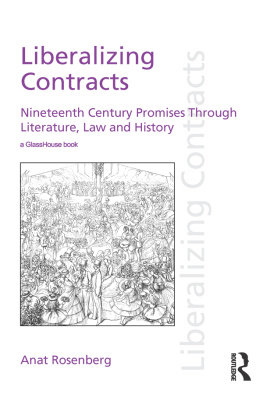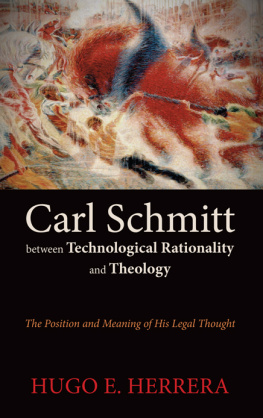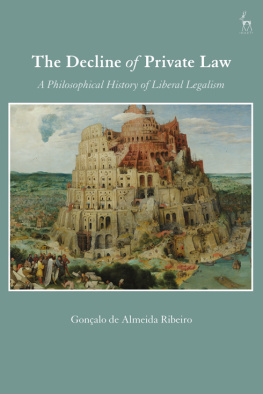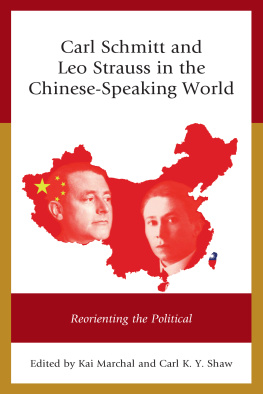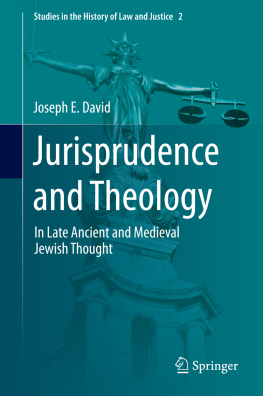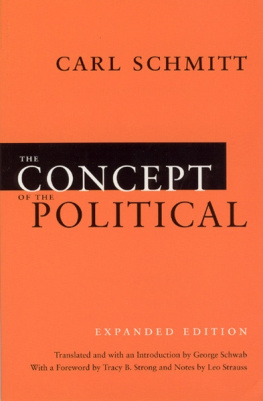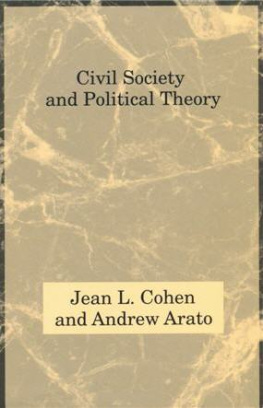
The Concept of Liberal Democratic Law
This book develops a historical concept of liberal democratic law through readings of the pivotal twentieth century legal theoretical positions articulated in the work of Herbert Hart, Ronald Dworkin, Duncan Kennedy, Rudolf Smend, Hans Kelsen and Carl Schmitt.
It assesses the jurisprudential projects and positions of these theorists against the background of a long history of European metaphysics from which the modern concept of liberal democratic law emerged. Two key narratives are central to this history of European political and legal metaphysics. Both concern the historical development of the concept of nomos that emerged in early Greek legal and political thought. The first concerns the history of philosophical reflection on the epistemological and ontological status of legal concepts that runs from Plato to Hobbes (the realist-nominalist debate as it became known later). The second concerns the history of philosophical and political discourses on law, sovereignty and justice that starts with the nomos-physis debate in fifth century Athens and runs through medieval, modern and twentieth century conceptualisations of the relationship between law and power. Methodologically, the reading of the legal theoretical positions of Hart, Dworkin, Kennedy, Smend, Kelsen and Schmitt articulated in this book is presented as a distillation process that extracts the pure elements of liberal democratic law from the metaphysical narratives that not only cradled it, but also smothered and distorted its essential aspirations.
Drawing together key insights from across the fields of jurisprudence and philosophy, this book offers an important and original re-articulation of the concept of democratic law.
Johan van der Walt is Professor of Philosophy of Law, University of Luxembourg.
Part of the
LAW AND POLITICS: CONTINENTAL PERSPECTIVES
series
series editors
Mariano Croce
Sapienza University of Rome, Italy
Marco Goldoni
University of Glasgow, UK
For information about the series and details of previous and forthcoming titles, see https://www.routledge.com/law/series/LPCP
The Concept of Liberal Democratic Law
Johan van der Walt
First published 2020
by Routledge
2 Park Square, Milton Park, Abingdon, Oxon OX14 4RN
and by Routledge
52 Vanderbilt Avenue, New York, NY 10017
Routledge is an imprint of the Taylor & Francis Group, an informa business
a GlassHouse book
2020 Johan van der Walt
The right of Johan van der Walt to be identified as author of this work has been asserted by him in accordance with sections 77 and 78 of the Copyright, Designs and Patents Act 1988.
All rights reserved. No part of this book may be reprinted or reproduced or utilised in any form or by any electronic, mechanical, or other means, now known or hereafter invented, including photocopying and recording, or in any information storage or retrieval system, without permission in writing from the publishers.
Trademark notice: Product or corporate names may be trademarks or registered trademarks, and are used only for identification and explanation without intent to infringe.
British Library Cataloguing-in-Publication Data
A catalogue record for this book is available from the British Library
Library of Congress Cataloging-in-Publication Data
Names: Van der Walt, Johan Willem Gous, author.
Title: The concept of liberal democratic law/Johan van der Walt.
Description: New York, NY : Routledge, 2019. | Series: Law and politics: continental perspectives | Includes bibliographical references.
Identifiers: LCCN 2019020963 (print) | LCCN 2019021744 (ebook) | ISBN 9780429059940 (ebk) | ISBN 9780367181802 (hbk) | ISBN 9780367181819 (pbk)
Subjects: LCSH: LawPolitical aspects. | LawPhilosophy. | DemocracyPhilosophy. | LiberalismPhilosophy.
Classification: LCC K487.P65 (ebook) | LCC K487.P65 V36 2019 (print) | DDC 340/.1dc23
LC record available at https://lccn.loc.gov/2019020963
ISBN: 978-0-367-18180-2 (hbk)
ISBN: 978-0-367-18181-9 (pbk)
ISBN: 978-0-429-05994-0 (ebk)
Typeset in Bembo
by Apex CoVantage, LLC
For Sibylle, v
Contents
The era of liberal democracy is over, claimed the head of a Member State of the European Union (EU) in May 2018 on entering a fourth term of government after a landslide victory in his countrys parliamentary elections.1 Heads of several EU Member States evidently share this conviction today. The balance between EU heads of state who share this conviction and those who dont still point favourably to the latter. But for how long? Almost all the Member States of the EU that officially still consider liberal democracy the foundational idea of government and politics are exposed and vulnerable to populist movements that openly reject the essential tenets of liberal democracy. Will these states hold firm against the waves of anti-liberal populist sentiments that, evidently, not only come crashing onto their shores from the outside, but also erupt from their own bosoms?
See https://www.dw.com/en/viktor-orban-era-of-liberal-democracy-is-over/a-43732540 (accessed April 2019).
An old undemocratic and illiberal Europe would appear to be rising from graves that liberal democrats considered soundly covered up and sealed. This book pays considerable attention to this old Europe. It relies for this purpose on the testimony of Carl Schmitt, one of its most talented and faithful spokesmen. In other words, it does not put words into its mouth. It lets old Europe speak for itself.
Schmitts testimony is extracted from his work Der Nomos der Erde. There is one aspect of this formidable work to which this book does not pay attention, namely, its interpretation of the Monroe doctrine. The Monroe doctrine, claims Schmitt, was at the heart of the New Worlds endeavour to keep the evils of old Europe away from its innocent shores. Depending on how forgivingly one reads American history, one may want to claim that the endeavour to keep the evils of old Europe away from American soil worked for quite a while. But one cannot continue to claim today that the Monroe strategy is still intact. The outcome of the 2016 presidential elections in the United States made it clear that the Monroe doctrine was not Europe-proof. Enough seepage must have occurred in the course of two centuries for old Europe to finally break the wall of the New Worlds resistance against it. Illiberal conceptions of democracy inform politics on both sides of the Atlantic today. Liberal democracy is very evidently critically threatened with extinction on both the eastern and western shores of the Occident ocean.
It is, however, not only liberal democracy that is threatened with global extinction today. Human existence itself, at least in the forms that we have come to know it until now, appears threatened by a global collapse of the planetary ecological equilibrium that has sustained it for thousands of years. The human race may well be on the threshold of a new age in which unprecedented strategies and means of survival will turn the ideals of liberal democracy into quaint relics of a golden age in which the human imagination still played around with ideas of freedom and democracy, and with the principles of justice envisaged by these ideas of freedom and democracy. These ideas and principles may soon be considered as irrelevant to our survival and well-being (whoever or whatever will constitute the we that informs this our) as the Modern Age considered witchcraft, sorcery and magic irrelevant for its future survival and well-being.


